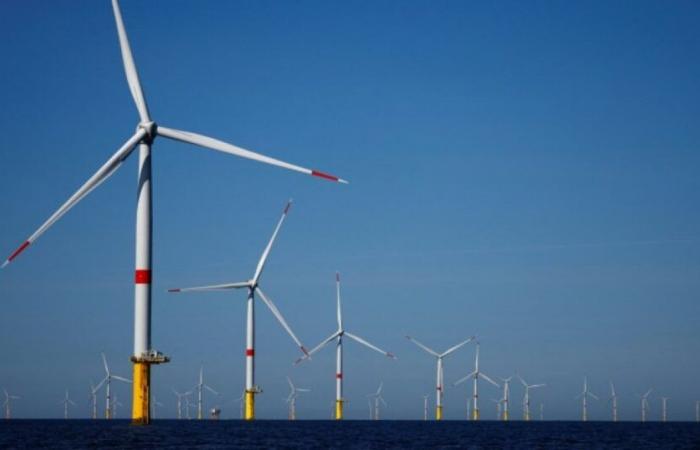
France will significantly reduce its consumption of fossil fuels by 2030, with the aim of reducing its gross greenhouse gas emissions by 50% compared to 1990, the government announced, presenting its report on Monday. road for energy and climate by 2050.
The share of fossils (oil, gas, etc.) will fall in its final consumption to 42% in 2030 compared to 60% in 2022, according to the Multi-Annual Energy Program (PPE), the roadmap for French energy policy on the ten years to come, and the National Low-Carbon Strategy (SNBC). It should then fall to 30% in 2035 and to zero in 2050.
“To achieve our energy objectives, we must move forward on two fronts: reducing our consumption through sobriety and energy efficiency, while massively developing the production of carbon-free energy,” declared the Minister of Energy, Olga Givernet, during the presentation on Monday, which comes a week before the annual UN Climate Conference (COP29, November 11-22).
“It’s not just a question of energy, it’s a societal choice that will determine our future,” she added. “Our carbon-free mix must be half nuclear energy, half renewable energy.”
Known for several months, the broad outlines of these planning texts had been revealed through the “ecological planning” already presented by the previous government and the integrated national energy-climate plan (Pniec) that France sent to the European Commission .
– Electrification of uses –
But their adoption had been delayed by the dissolution of the previous assembly and the long process of forming a new government.
The strategy revolves around the production of carbon-free energy but also the electrification of uses, in mobility or industry through buildings.
Thus, France is aiming for a sales objective of two thirds of electric cars by 2030 and 15% of electric cars in the country's fleet by the end of the decade, compared to 2.2% at the start of 2024. In October , sales of electric cars represented 15% of the total in France, down year-on-year.
The building sector, which reduced its CO2 emissions by 5.5% between July 2023 and June 2024, should in total reduce its emissions to 35 million tonnes of CO2 equivalent per year in 2030 compared to 62 Mt in 2022 and 93 Mt in 1990, the reference year, to achieve national objectives.
It targets the renovation of “400,000 individual houses and 200,000 collective housing units each year on average by 2030”. Main vector of decarbonization: the replacement of oil boilers.
The implementation of the energy transition “requires strong progress in the electrification of industry, transport and buildings”, underlined the French Electricity Union (UFE), calling for a “Plan d “electrification of uses” integrating the issues of purchasing power, competitiveness and sovereignty, “by capitalizing on our energy and industrial assets.”
– Consume more electricity –
To achieve this ambition, France will have to consume more electricity (essentially decarbonized in France due to its nuclear power), which will increase from 27% in 2022 to 34% in 2030 and 39% in 2035 in the country's final energy consumption.
The counterpart of this strategy involves sobriety, with a reduction of 30% in 2030 in energy consumption compared to 2012 and 50% in 2050.
“Ecological investment is sometimes the best defense against future public spending,” summarized the Minister of Ecological Transition, Agnès Pannier-Runacher. “Repeated events of flooding in France and abroad, we all have in mind the tragedy of Valencia, show us (…) that it is more than urgent to accelerate the reduction of our emissions of greenhouse gas,” she added.
The publication of these two documents launches the public consultation, which will end on December 15. They will then be submitted to the High Council for Climate (HCC) in particular before the publication of the implementing decrees expected in 2025.
Another important document, the third version of the National Plan for Adaptation to Climate Change (PNACC-3), was published last week. It was designed based on the hypothesis of a warming compared to the pre-industrial era of 4°C in France by the end of the century (compared to 1.7°C at this stage).





